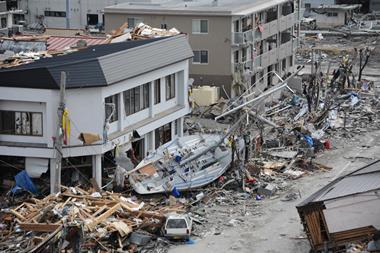RMS released insured loss estimates for the recent Tohoku earthquake and tsunami
The total insured property loss from the devastating magnitude 9.0 Tohuku earthquake and tsunami will be between ¥1,500 and ¥2,170 billion (UK£11bn and £16bn), according to Risk Management Solutions (RMS).
The total cost reflects losses from multiple sectors, including local market residential, co-operative insurers, domestic and international commercial and industrial lines and marine and aviation lines, and accounts for both direct and contingent business interruption.
“Insured exposure in Japan is a complex landscape of coverage, varying considerably by class of exposure and line of business,” said RMS’ chief research officer, Robert Muir-Wood. “The biggest challenge to loss modeling of the Tohoku event is not the details of the property damage itself, but rather sampling and modeling the underlying pattern of insurance take-up rates and restricted terms of coverage. Residential and commercial earthquake insurance was purchased in areas where people perceived the threat, but the Tohoku earthquake was not an event they were led to expect.”
The loss estimate does not, however, account for losses sustained following the Fukushima nuclear disaster, as nuclear risks are excluded from coverage. Residential earthquake insurance is covered by the Japan Earthquake Reinsurance company, who are not reinsured outside of Japan. The RMS model predicts that losses to household insurance coverage purchased through a co-operative or commercial insurer will account for around 50-60% of the total, while commercial and industrial losses will be about 30-35%.
The greatest uncertainty in the model’s loss estimates relates to corporate claims in contingent business interruption protection. The disruption in the supply-chain market for critical parts has already created disruption in the key battery, flash memory, microchip and automotive market in Europe and the U.S., as well as Japan.
On Wednesday morning, Toyota announced that it was to suspend production in five European plants across April and May as a result of a supply shortage, while industry sources suggest that smartphone sales could also drop by 5-7% this years as a result.
With smartphone companies Apple, Sony Ericsson and Nokia all set to announce their first quarter figures between 19-21 April, this could be the first demonstration of the effects of the earthquake upon the global supply chain.



















